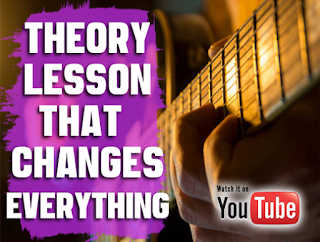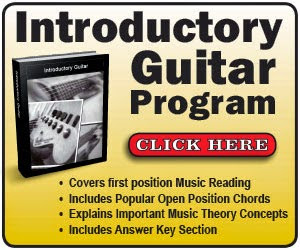A Theory Lesson That Changes Everything
 In this weeks YouTube posting I'll be covering some of the work of bass player, musician and teacher extraordinaire Anthony Wellington... We will
focus on his thoughts regarding music theory and in particular his
concepts regarding the simplification of keys and practice through the
the study of the key signatures.
In this weeks YouTube posting I'll be covering some of the work of bass player, musician and teacher extraordinaire Anthony Wellington... We will
focus on his thoughts regarding music theory and in particular his
concepts regarding the simplification of keys and practice through the
the study of the key signatures. With all the work that you'll tend to do in your life as a musician (in training) with scales and arpeggios and chord harmony, this is going to be a very interesting lesson. Especially for those of you who've never been exposed to these theoretical principles.
After this discussion, I think that you'll walk away with some interesting new directions of thought regarding how you perceive your own personal musical development, and how you currently apply a few of the corner-stone principles of music theory.
WATCH THE VIDEO:
Musical Awareness:
In many of Anthony Wellington's lectures he likes to discuss levels of awareness when studying an instrument, like the first ever stage of being blissful, happy and excited about your instrument, as in when you first held your first guitar.
Think back to when you'd first held your first guitar, how did you feel the first time you ever held your first guitar. You didn't know back then what you needed to learn, you were just excited to have that instrument in your hands. It was pure bliss!
The next level is moving to being more aware and getting to know what things are going to be important to learn on your instrument. Things like learning to make a clear sound and developing an ability to feel rhythm.
Learning notes and keys and scales. Sadly, some players never make it past this stage of development, (the hobbyist) because it involves so much effort and time, patience and dedication, to go further beyond this point.
If a musician can make it past that second stage, then they come to a new level where they reach an understanding with information. At this stage they are thinking about a lot of information while they perform. It's a stage that Anthony says "good" musicians reach.
However, there are limitations at this stage because within it, there's a whole lot of thinking going on to achieve the playing. Now, if musicians can push past this one, they reach the ultimate stage which is what Anthony calls, "Unconscious Knowing."
In this state of mind, the musician is blissful and is no longer thinking, the music just naturally pours out of them, without effort. They simply know what they're doing so well, so perfectly that the music becomes a spiritual experience that takes no real conscious thought or effort to produce.
The 30 Musical Keys Principle:
Now that you know a little bit on how Anthony Wellington thinks about a musicians stages and levels of awareness, let's dig into his foundational music theory concepts on musical keys. His views are different, because they reach further than the common 12 keys concept.
Music keys are the cornerstone, the building blocks for everything we do, so they need to be well understood. Most musicians think in terms of there being 12 keys. But, not Anthony, he takes the perspective of this a little bit differently with instead of 12, he thinks in terms of there being 30 different keys.
And, if you met him, he'd probably ask you, "Do You Practice in Every Key?"
Now, you're probably wondering what this means. To begin with, Anthony believes in treating Minor and Major keys separately. So, instead of thinking in terms of 12 keys, now there's 24 keys. But, that still leaves 6 keys unaccounted for.
Let's clear all of this up by breaking this down step-by-step...
There's one Major key with no sharps and no flats. That's the key of, "C Major." Then, there's seven Major keys with sharps. Starting from "G Major" (which has one sharp), all the way up to "C# Major," (which has all seven tones as sharps).
This means that so far we have 8 keys up to this point. But, then there's the Major flat keys, from "F Major" (with one flat), up to "Cb Major" (with all seven notes flat). Now we've got seven sharp keys, seven flat keys and one natural key, giving us a grand total of 15 Major keys. Double that to include the Minor keys and you've got 30 different keys.
So, once more, back to that initial question, "Do You Practice in All Keys?"
Know Your Accidentals:
Before we wrap up, here's another great Anthony Wellington theory idea of knowing the accidentals in keys, I call it the, Theory of Seven.
How many sharps are in "E Major?" That would of course be four. Now, how many flats are there in "Eb Major?" There's three right. What does that total? Right, SEVEN.
The total between sharp and flat keys always equals seven. Let's test it again, how many sharps are there in "A Major?" There's three, so how many flats have to be in "Ab Major?" There has to be four because they always total seven!
Same thing works for minor. How many sharps are in "D# Minor? There's six, so that means, "D Minor" has to have one flat to add up to our theory of seven.
And, the one note in "D# Minor" that isn't sharp, (which is the note of "B"), is the one flat tone found in "D Minor." "D Minor" has ONE flat, "Bb."
It's all a numbers and letters game that's easy to make sense of when you start thinking about it in simple ways.
Some of these principles on musicianship and music theory that we've discussed here can be found easy enough online through different lectures that have been posted by Anthony Wellington, and also by bassist, "Victor Wooton."
A few other musicians are also quite dedicated to posting concepts about music theory in a way to keep things simplified and straight-forward. The bottom line is, that Music Theory and learning music in general and becoming a musician, doesn't need to be difficult or complex.
Most important, everyone needs to realize that sometimes it doesn't take a lot of information to make a big difference, all it takes is an idea that's explained in just the right way, so that it can be taken in and used.
VISIT THE WEB-SITE:
Thanks for joining me, If you'd like to Find Out What You Should Learn Next on Guitar - take a look at the courses over on my website at CreativeGuitarStudio.com.
My step-by-step; Beginner, Intermediate and Advanced courses will cover what you need to know, along with how to be able to move forward and become the best player that you can be. I've worked on these courses since 1992 and I feel that all together they're the best guitar program you'll ever find.
The courses will help you learn to identify what's required to get you up to the next level of guitar playing, in a very organized way, that makes sense.
I look forward to helping you further at CreativeGuitarStudio.com ...Until next time - take care and we'll catch up again on the next video. Bye for now!
___________________________________________________
GET GOOD NOW - JOIN THE MEMBERS AREA
Guitar Chords | F Chord | Guitar Notes | G Chord | C Chord | D Chord | Guitar String Notes









